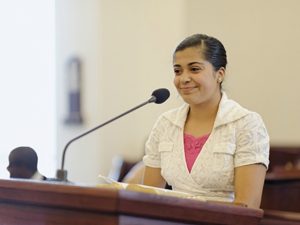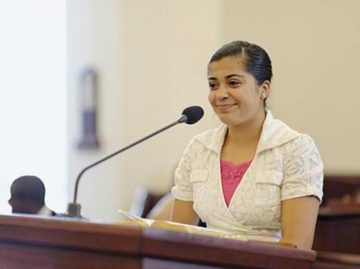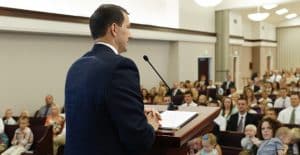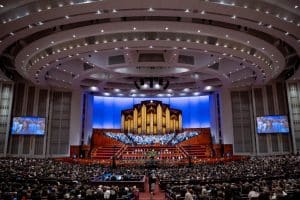 I was scheduled to speak first in Sacrament Meeting but realized right before the meeting started that I had left my talk on the kitchen table. I asked my husband to run get it and then told the bishop that I needed to be the second speaker in case my husband didn’t return in time. The bishop said that wasn’t okay because a priesthood holder had to have the final say in the meeting. He told me I could speak second, but he would need to add a few words at the end of my talk to ensure a priesthood leader had the final say. After the meeting, I walked outside and sobbed and sobbed at the idea that my spiritual words weren’t good enough.
I was scheduled to speak first in Sacrament Meeting but realized right before the meeting started that I had left my talk on the kitchen table. I asked my husband to run get it and then told the bishop that I needed to be the second speaker in case my husband didn’t return in time. The bishop said that wasn’t okay because a priesthood holder had to have the final say in the meeting. He told me I could speak second, but he would need to add a few words at the end of my talk to ensure a priesthood leader had the final say. After the meeting, I walked outside and sobbed and sobbed at the idea that my spiritual words weren’t good enough.
– Meredith Reynolds
My ward still has a male closing speaker for Sacrament Meeting every week. When I have mentioned it to the bishopric, I am told that they know it isn’t policy, but I’m the only one it bothers, so they don’t feel the need to change.
– Lori LeVar Pierce
Last Sunday I realized that during the entire Sacrament Meeting, not one woman spoke. Between the opening and closing prayers, the sacrament prayers, the conducting bishopric member, the bishop, the youth speaker and two other speakers, we listened to nine males speak. The fact that it can be so easy (and unremarkable) to completely omit women’s voices during the most important meeting of our worship service is, I feel, an example of the structural inequality we need to overcome.
– Stephanie
Pro tip: It is not church policy to have a priesthood holder speak last. Show that your ward values women’s voices by scheduling women as the final speaker at least half the time, by having at least one woman speak each Sunday whenever possible, and by having some Sacrament Meetings with only female speakers.
Click here to read all of the stories in our #hearLDSwomen series. Has anything like this happened to you? Please share in the comments or submit your experience(s) to participate in the series.
“If any man have ears to hear, let him hear.” (Mark 4:23)






13 Responses
Unbelievable what you experienced. The culture that perpetuates this must change. Thank you for spotlighting your experiences, we all need to speak up!
Feminists. The patriarchy. Woe is me!
More examples that illustrate that women have no value in the mormon faith.
I’m as anti as it comes I guess. I was on multiple bishoprics. This was never a consideration. We were begging for anyone to speak.. same with closing prayer. Maybe this was unique to Australia? I had heard of some old timers requiring a Male to closing prayer a sacrament, but in 30 years not seen that required
It’s leadership roulette, unfortunately. It says nothing in the handbook about having men speak last. When I was in leadership, we didn’t care about order but we tried our best to hear from male and female voices on the same day, and tried to avoid having only one gender speak. But I know other bishops feel differently and I’m not really clear how it adds value or builds faith for anyone.
My branch does this too. What really infuriates me about it is that the sisters bear all the testimonies at testimony meeting (after the branch presidency member does his opener) so our sisters always bring THAT meeting to a close every month (because men never stand and deliver at testimony time), so why can’t women have the final word during sacrament meeting, too? Ridiculous hypocrisy, allowing women to close only when men aren’t getting up and speaking.
Today I attended stake conference where there were MORE women speakers than men. I noticed it and appreciated it. After the conference, I emailed my stake president and thanked him for the equality of speakers and his sensitivity, thoughtfulness and spiritual guidance when assigning them. He later responded and thanked me for my kind email and for my attendance at the meeting. I was happy and excited for the equality I saw, and I was sincere in my thanks to the stake president.
We need to both call out when we see inequality (especially in situations seen in the article) and also NOT FORGET to praise and express gratitude and thanks when we see members helping the cause.
I place not one, but TWO meaningful comments supporting the idea that more women should be heard from, citing the last FOUR wards I’ve been in, but as it does not seem to fit someone’s narrative, my contribution gets ‘disappeared’…
Seems to me someone only wants one side of THEIR narrative… I seek to legitimately support a more equitable and just solution to gender inequity within a gospel framework, but someone has a deaf ear to positive experiences that are male…
AlbertaTim, because of previous violations of our comment guidelines, your comments are moderated, which means that they do not automatically appear. When you post future comments, they’ll be approved or disapproved by the post author. Those comments which do not break comment guidelines will generally be approved, the others not. Regardless, there is a waiting period and no comment will be posted immediately.
I once brought this up to my Bishop and stake president, together, at the same time, and my stake president told my Bishop to start letting women speak last. Even after that, he didn’t. That was years ago and in my ward, a woman only speaks last if there are no male speakers at all.
I’m sad to see that feelings I have experienced seem to be experienced by others as well. It’s doubly heartbreaking.
I was recently asked to speak in the Saturday evening session of my Stake Conf recently, I was told I would have 5 minutes to speak. Everyone else spoke for 15-20min I was the only non-married female speaker(there was only one other female speaker).
The stake secretary that had called and asked if I would speak earlier in the week told me after the meeting he wanted to hear me speak longer, I told him — you told me five minutes, but everyone else seemed to speak for considerably longer, and I can only conjecture as to why that was. He turned red in the face and awkwardly thanked me again for my talk and that he enjoyed it.
Every ward I’ve been to usually always has men speak last. I wonder how this tradition started in the first place? At first I thought it was a “ladies first” type thing that was meant to be courteous to women. But when you look at how high councilors are always the last speakers (and the keynote speakers), then it makes you think twice about that. This tradition has to stop because it sends the message that men’s words are more important.
I left this comment on another post but it applies here too. As others have mentioned, this will vary dramatically between wards and it depends entirely upon the members of the bishopric making the assignments.
I thought I would share a few tips for any bishopric members who are researching this topic. I’m responsible for making all sacrament meeting talk assignments in our ward and I’ve developed a simple rule: the order of speakers is determined by the amount of time each speaker has served in the Church. For example, an elderly lifelong member will generally speak last, regardless of gender. Youth, younger members, and recent converts will generally speak first. There are a few exceptions to this rule:
1. Current ward council members (e.g. the current Relief Society president, even if less experienced than other speakers, would speak last)
2. Special occasions (e.g. a returning missionary or visiting authority would speak last, regardless of gender or age)
3. Upon request (speakers sometimes request not to be the last speaker, and I always try to honor that)
In 2018, I invited 70 people to speak and determined the speaking order in 23 sacrament meetings. Of all the speakers, 40 (57%) were brothers and 30 (43%) were sisters. Of all the concluding speakers, 13 (57%) were brothers and 10 (43%) were sisters.
(Note: the ratios above would essentially be 50-50 if we had full-time sister missionaries serving in our ward—I always ask the missionaries to speak shortly after being transferred into our ward—however, we currently have 4 elders and no sisters.)
Hopefully this is helpful for anyone looking to improve the way speaking assignments are handled!